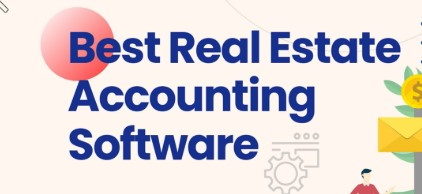Accounting Software for Real Estate Developers: Streamline Finances and Maximize Profitability
Keywords: accounting software for real estate developers, real estate development accounting, property finance management, construction project accounting, real estate ERP
Managing the finances of a real estate development company isn’t just about tracking expenses—it’s about managing multi-million-dollar projects, balancing budgets, optimizing cash flow, and ensuring every cent is accounted for. Generic accounting tools aren’t built for this complexity. That’s where specialized accounting software for real estate developers makes all the difference.
In this blog post, we’ll explore what makes accounting software essential for real estate developers, the top features to look for, and the best tools available in the market today.
Why Real Estate Developers Need Specialized Accounting Software
Real estate development involves large-scale, long-term projects with multiple stakeholders, phases, and transactions. Standard accounting platforms often lack the functionality to handle:
- Multiple projects simultaneously
- Construction-specific costs and billing methods
- Progress payments and retainage
- Complex tax and compliance structures
Specialized real estate accounting software provides tools designed to address these challenges, offering better accuracy, control, and efficiency.
Key Features to Look for in Real Estate Accounting Software
1. Project-Based Accounting
Track income, expenses, and profits per property or development project. This gives clarity on which projects are profitable and where costs are going over budget.
2. Job Costing
Break down costs into categories like labor, materials, permits, and subcontractors. Compare estimated vs actual costs in real time.
3. Budgeting & Forecasting
Create and manage detailed budgets for each project. Forecast future cash needs and anticipate financial bottlenecks before they arise.
4. Accounts Payable and Receivable
Manage vendor invoices, subcontractor payments, rental income (if applicable), and customer billing. Automate recurring invoices and payment reminders.
5. Cash Flow Management
Track cash inflow/outflow across all projects and business accounts to avoid funding issues and improve decision-making.
6. Tax and Regulatory Compliance
Automate calculations for taxes (e.g. VAT, GST, property tax), generate audit-ready reports, and maintain compliance with local financial regulations.
7. Multi-Entity & Multi-Project Support
Easily manage finances for multiple entities (like LLCs or joint ventures) and developments without creating separate systems.
8. Integration with Project Management Tools
Connect accounting with tools like Procore, Buildertrend, or CRM platforms to unify financial data with operations and sales.
Top Accounting Software Options for Real Estate Developers
Here are the leading solutions trusted by real estate developers:
1. Sage 300 Construction and Real Estate (CRE)
- Best for: Mid to large-scale developers
- Features: Full project costing, payroll, contract management, financial reporting
- Pros: Scalable, construction-focused
2. QuickBooks with Real Estate Add-Ons
- Best for: Small developers or new startups
- Features: Custom fields, basic job costing, third-party integrations
- Pros: Easy to use, affordable
3. Buildium
- Best for: Developers who also manage rental properties
- Features: Accounting, property management, leasing tools
- Pros: All-in-one solution for finance and property management
4. RealPage Accounting
- Best for: Developers with large residential or commercial portfolios
- Features: GAAP-compliant accounting, budgeting, vendor management
- Pros: Powerful reporting and automation
5. MRI Software
- Best for: Enterprises with mixed real estate assets
- Features: Lease accounting, investment management, real estate ERP
- Pros: Highly customizable and scalable
Benefits of Using Real Estate-Focused Accounting Software
- ✅ Increased Financial Accuracy
Avoid errors in budgeting, billing, and forecasting. - ✅ Better Project Visibility
Monitor the financial health of each development in real time. - ✅ Faster Decision Making
Use real-time data to decide when to scale, reinvest, or pivot. - ✅ Simplified Tax Season
Generate tax-ready financial reports with a few clicks. - ✅ Investor Confidence
Provide accurate, transparent financial statements to investors and partners.
Common Challenges Without Proper Software
- Disorganized financial data across spreadsheets
- Unclear project profitability
- Missed tax deadlines or penalties
- Cost overruns due to poor tracking
- Miscommunication between departments
The solution? Invest in real estate accounting software that grows with your business.
How to Choose the Right Software for Your Business
Consider these factors when selecting accounting software:
| Criteria | What to Look For |
|---|---|
| Business Size | Can it handle your current and future needs? |
| Industry Fit | Is it designed for real estate or construction? |
| User-Friendliness | Can your team learn it easily? |
| Integration | Does it connect with your CRM, ERP, or project tools? |
| Support & Training | Is customer support reliable and available? |
| Price | Does it fit your budget and offer good ROI? |
Final Thoughts
Accounting is the backbone of any successful real estate development company. Choosing the right real estate accounting software means fewer financial surprises, more accurate planning, and stronger growth.
Whether you’re building a single-family home or managing dozens of high-rise developments, investing in the right financial tools now will save your business time, money, and stress in the long run.
Suggested Featured Image
A modern office desk with a blueprint, laptop showing a dashboard, calculator, and a real estate model in the background—symbolizing financial planning in real estate.
